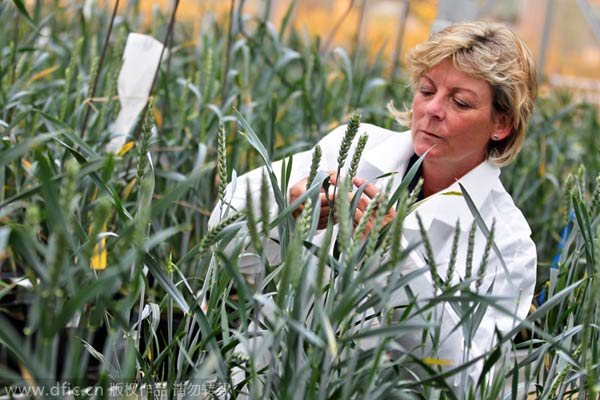 |
|
Kerstin Grosser, a technical assistant of Bayer CropScience, checks the growth of plants at the new European wheat cultivation center in Gatersleben, Germany, June 6, 2012.[Photo/IC] |
Bayer CropScience AG, the agricultural subgroup of Germany's Bayer AG, will introduce 21 new products into China before 2020, as well as invest 10 million euros ($12.62 million) in recruiting workers for further expansion, said its global head.
Liam Condon, chief executive officer of Bayer CropScience, said products such as high-yielding seeds, herbicides, fungicides and advanced farming applications will be key drivers of China's agricultural development.
"These new products will be used in the areas of crop protection, non-agricultural pest control, seed treatment and plant biotechnology," said Condon. "We are convinced of the long-term growth potential of agricultural markets despite the increasing volatility of the global market."
To feed a population of more than 1.3 billion, more agricultural and related products are made and sold in China than anywhere else, and overall food consumption has risen over the past decade. China has become a fast-growing market for international agricultural marketers and producers from Europe and the United States.
 |
| Agro-project aims for sustainable, efficient farming |
 |
| Bayer HealthCare to expand production capacity |
About 400 million euros will be invested by Bayer in the Asia-Pacific region and Latin America between 2013 and 2016. Condon said this includes the continued investment in its formulation site in Hangzhou, capital of Zhejiang province, and its main crop protection manufacturing site in Vapi, India.
The company employs more than 2,000 employees in China. Its Hangzhou plant so far has provided more than 40 kinds of products, including biological pest-control agents used to treat various crop diseases caused by fungal pathogens.
"Rising incomes and accelerating urbanization in China have increased the consumption of grains, meat proteins and vegetable oils. Bayer CropScience sees an upside to the agricultural output in China, especially in the areas of crop protection, seeds and plant traits," said Condon.
China is providing fiscal support to rural areas to ensure grain security. A total of 1.38 trillion yuan ($223.56 billion) was spent in agricultural areas in 2013, up 11.4 percent year-on-year.
Governments at all levels have accelerated land-use rights registration in China, an essential step if individual farmers wish to work in cities and decide to transfer their land to big farm owners.
Condon said China's land reform policies and innovative farming entities such as family farms and agricultural cooperatives will encourage large-scale agricultural operations and eliminate the shortcomings caused by traditional small-scale farming and urbanization.
Ding Lixin, a researcher at the Chinese Academy of Agricultural Sciences in Beijing, said foreign agricultural companies are proficient in selling products and applications to large-scale farming operations, and the government's move will further boost their sales in the Chinese market.
"Because China still faces many challenges to ensure grain output growth, including extreme weather conditions, declining farmland quality and water shortages, gaining foreign products, technologies and farming methods is practical to secure a 95 percent self-sufficiency grain supply rate for the country," Ding said.
